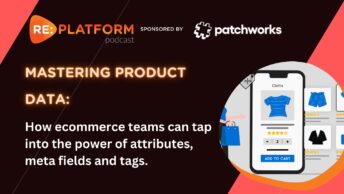An interview with Oliver Rhodes, cofounder at Nolo Apps, who specialises in using Airtable to help ecommerce businesses improve productivity in their technology stack
Listen on your favourite player
Watch the video
Tl;dr
- What are the common operational issues ecommerce business face around product data management?
- What is Airtable and how can it benefit ecommerce businesses?
- How is Nolo Apps helping business use Airtable for operational efficiency gains?
- How can businesses get started with Airtable?
We’ve been keeping a keen eye on Airtable this year, as it’s becoming more popular with ecommerce businesses. Designed to enable data connectivity and the building of apps to empower teams to work faster and more confidently, this episode dives into what it is and how it’s being used.
Oliver Rhodes has a stack of experience building out technology solutions for businesses doing between £1M to £200M in revenue. He recently co-founded Nolo Apps, specialising in designing and building apps on Airtable to help improve productivity whilst reducing running costs.
Tune in for practical insights into how Airtable fits in to the modern ecommerce tech stack.
Discussion notes
- Let’s start with your background Oliver, as you’ve got stacks of experience with ecommerce back office and ops from being head of growth at PeopleVox, so what do you do now and why?
- And let’s drill into the common operational issues you see in ecommerce businesses in regards to systems connectivity and interoperability – what mistakes do people make / what constraints are hampering them?
- Where does Airtable fit in – first what is it and how is it relevant to ecommerce?
- What size/type of ecommerce business does this suit and why?
- Airtable has been getting more coverage recently on places like LinkedIn – why are more businesses now starting to build it into their tech stack?
- Let’s focus on one area where you’re building out custom apps to improve operational processes: product lifecycle management – why do you think other systems don’t always cut it?
- Where do you start with Airtable as it has so much flexibility: what functions can it perform for product data management, and how does it benefit the different parts of the business from buyers to ecommerce merchandisers?
- How do you connect data inputs/outputs with external systems like a PLM or pushing out data into ecommerce – what are the integration options and API capabilities?
- Airtable has an integrations marketplace but it looks pretty limited, how much of the integration work for ecom platforms like Shopify, Adobe, BigCommerce, Salesforce etc. is custom?
- What’s the cost model comparison for someone used to a 3rd party PIM, how do the upfront dev and integration fees and ongoing licensing compare?
- For ecommerce teams currently using a PIM but it’s not giving them the data view they need, what’s the migration path, how long, how expensive and what effort is required from them?
Want to suggest a topic or guest for a future episode? Contact us via the website or on LinkedIn.






